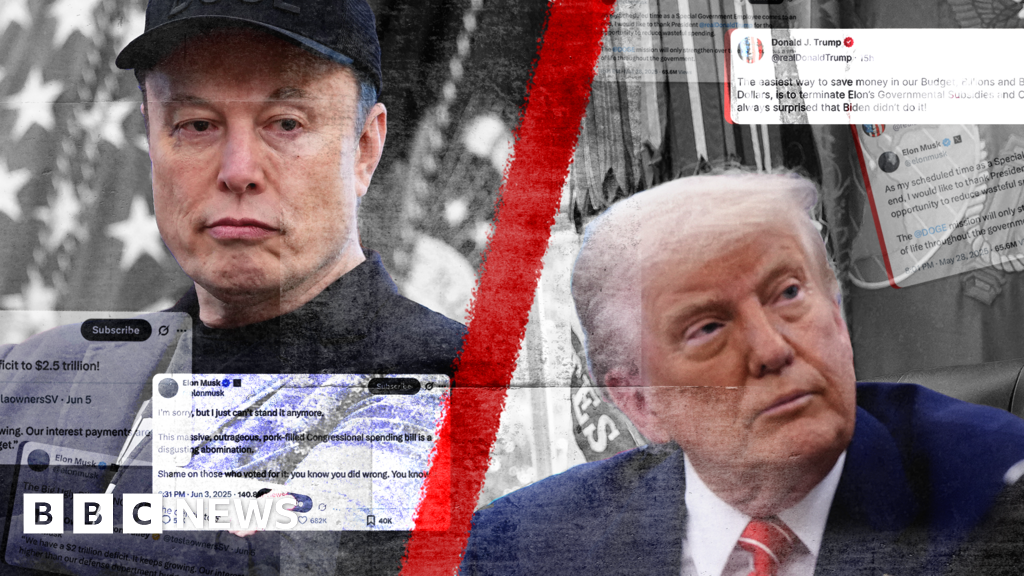Our investigation, conducted as part of a project by the French-speaking public media association MFP (Médias Francophones Publics), spanned a five-month period, from November 4, 2024, the day before US President Donald Trump's re-election, to April 4, 2025. We examined more than 15,000 of his posts on X.
Read moreElon Musk's tweets (1/2): A conduit for pro-Russian anti-Ukraine rhetoric
To analyse these posts, we developed a data-analysis tool powered by artificial intelligence (see our sidebar at the end of the article). The AI helped us identify the hundreds of tweets that make up Musk's anti-Ukraine rhetoric, enabling us to precisely track and measure his anti-European rhetoric online. We also paid close attention to the billionaire's interactions, counting his retweets, replies, and quote tweets. This dataset was then manually verified and analysed by our journalists, post by post.
Influencers amplified by Elon Musk
A key finding of our investigation is that Elon Musk significantly boosted the visibility of far-right influencers in Europe, such as German YouTuber Naomi Seibt, often described as the "anti-Greta Thunberg."
According to our investigation, based on an analysis by Belgium’s RTBF, Naomi Seibt's profile garnered 1,117 likes in the analysed period before interacting with Elon Musk. After being quoted and retweeted by Musk, her likes surged by 624%, reaching a total of 8,091. A similar increase was observed for her retweets, which saw a 781% rise.
The same phenomenon occurred with "Radio Genoa", an Italian anti-immigration influencer, whose like-count doubled after interacting with Elon Musk's account.

Musk also amplifies accounts associated with the American alt-right, such as former Trump administration member Mike Benz; profiles known to be close to Russia, like the Lebanese-Australian influencer Mario Nawfal; and cryptocurrency influencers, including the account Inevitable West. The Polish ultra-conservative media outlet Visegrad24 also appears among the most frequently cited profiles.
Weidel, Orban, Meloni: clear support for far-right leaders
Musk also promotes leaders of far-right political parties in Europe. In total, he mentioned Germany's AfD and its leader Alice Weidel 57 times. He also hosted a live conversation with her on X on January 9, 2025 (archive). Nigel Farage and his Reform UK party were mentioned 21 times.
To display this content from , you must enable advertisement tracking and audience measurement.
Musk has repeatedly shown his support for the British far-right activist and English Defence League founder Tommy Robinson, who was jailed for 18 months after making false allegations about a Syrian refugee. Musk called for his release, posting about him 26 times.
In addition to figures in Germany and the UK, Musk also mentioned multiple far-right figures from across Europe, including Italian Deputy Prime Minister Matteo Salvini, Italian Prime Minister Giorgia Meloni, and Hungarian Prime Minister Viktor Orbán. He also publicly advocated for the release of Marine Le Pen on April 4, 2025 (archive), after the French politician was convicted of embezzlement – though she was not imprisoned. In total, the former French presidential candidate appears in 13 of the billionaire's posts.
“It can be argued that Elon Musk is interfering in European elections, even though it’s difficult to determine whether the AfD’s relative success in recent elections was directly attributable to his influence,” said Jérôme Viala-Gaudefroy, who has a doctorate in American civilisation and wrote the book “Trump’s words” ("Les mots de Trump").
199 posts directly in favour of the far right
By analysing the posts’ content to identify the parties mentioned (using party names and key figures as keywords), we found that Musk published 199 posts favourable to the European far right. He particularly backed far-right movements in Germany and the United Kingdom, as shown in the graphic below.

The billionaire frequently comments on the electoral affairs of these two countries. For instance, he explicitly called for votes for the AfD, Germany’s far-right party. This drew sharp criticism following the Christmas market attack in Magdeburg, Germany, on December 20, 2024, after which he published a dozen posts. Former European commissioner Thierry Breton (archive) accused Musk of “foreign interference”, claiming he was using the attack to bolster support for the AfD. Musk further intensified his pro-AfD posts in the run-up to the German legislative elections, which took place on February 23, 2025. On February 13, 2025 (archive), he said the AfD was “the only hope for Germany”.
Regarding the United Kingdom, Musk published 26 posts supporting the far right within the week of December 26, 2024. He expressed delight that membership of the British populist right-wing party Reform UK (archive) surpassed that of the Conservative Party.
1,308 posts criticising Europe
How significant is Elon Musk’s anti-Europe campaign? In just five months, the billionaire published 1,308 posts criticising Europe, an average of 7.2 posts per day on this topic alone.
Through an AI-driven analysis of the posts’ content, we identified the geographical focus of these posts. The analysis revealed that the United Kingdom, with 593 posts, is the most frequent target of Musk's criticism, followed by the European Union and its institutions, Germany, and Ukraine.

'Europe is everything Elon Musk can't stand'
“Europe, and in particular the European Union, is everything Elon Musk can't stand,” Viala-Gaudefroy said. “Musk has a very masculinist and anti-woke perspective, while Europe tends to be progressive. Ideologically, Elon Musk is a libertarian, fiercely opposed to regulation, while the EU regulates extensively. He believes businessmen are the masters of the world and should not be hindered.”

We identified five key anti-European themes mentioned by Musk in his posts.
Musk has been particularly critical of European migration policy. This is the topic he criticised the most in his tweets on Europe, with 391 posts. On February 14, 2025, the billionaire shared a short excerpt of the speech given by US Vice President JD Vance (archive) at the Munich Security Conference, where Vance explicitly targeted Europe. Vance said there was “nothing more urgent than mass migration”, adding that the number of immigrants from non-EU countries who entered the bloc “doubled” from 2021 to 2022. This post garnered more than 55 million views on Elon Musk’s account.
In his tweets, Musk also decries what he claims is a link between immigration and crime. He mentions 103 times the “grooming gang” scandal, a decade-old scandal of sexual assaults perpetrated by men of Asian origin in the UK. On January 3 (archive), Musk directly criticised British Prime Minister Keir Starmer, accusing him of being “complicit in the rape of Britain” due to his past position as a prosecutor in the Crown Prosecution Service.

Europe's foreign policy is also on Musk’s radar. The billionaire supports influencers opposed to European aid to Ukraine and openly advocates for the United States to withdraw from NATO. “Doesn’t make sense for America to pay for the defense of Europe,” he wrote on March 9, 2025, in a post which garnered over 72 million views.

Musk also routinely criticises the workings of European democracy and the European electoral system. The billionaire has repeatedly railed (archive) against the annulment of the first round of Romanian presidential elections, and the subsequent exclusion of the far-right candidate, Călin Georgescu, following accusations of Russian interference in the electoral process.
In addition, Musk's tweets frequently target European regulations, including rules on moderating social-media content. On January 14, 2025, he posted a single-word message "groan" (archive) in response to criticism of US tech giants by Breton, the former EU commissioner. Breton had criticised the way Musk and other US tech giants denounce the EU's moderation requirements – designed to ensure healthy democratic debate on social media platforms – as "censorship".

“This is very much in line with what we've seen from Musk and his long-standing interest in free speech and his long-standing critique of any sort of regulation that will abridge free speech,” said Jessica Yarin Robinson, a researcher at Oslo University who specialises in digital media. “But again, this is not just about his own personal views on free speech, this is also a financial issue. Musk owns X, which operates in Europe and has to deal with regulations like GDPR, the Digital Services Act, or country-level laws regulating free speech. This is really a regulatory headache for him.”
The billionaire's tweets suggest he hopes to export certain American values to Europe. For instance, in response to an X user complaining about living in Europe “when everyone is celebrating the end of woke bullshit [in the US]” (archive), he replied: “We will do our best to help from America!”
We were also able to identify the countries Musk mentioned most frequently within each of these themes.
To display this content from , you must enable advertisement tracking and audience measurement.
The UK emerges as the primary target in most of these main themes, with the exception of Musk's criticism of Europe's foreign policy, which focuses primarily on Ukraine.
Through both his interactions and the topics he posts about, Elon Musk acts as a promoter of the American and European far right on his social media platform.
According to Viala-Gaudefroy, this is not surprising. "The billionaire aims to establish a far-right network. The goal is to build a kind of international alliance between authoritarian nationalists, potentially including Russia and even China,” he says.
To study Musk’s messaging on X, teams from the France 24 Observers and Belgian broadcaster RTBF analysed and categorised more than 15,000 tweets and retweets shared by his account (@elonmusk) between November 4, 2024 and April 4, 2025.
In order to analyse all of these tweets, we used a method created by researchers in cognitive science at the French higher education institute l'École Normale supérieure (for more on the method click here), which allowed us to catagorise text using the ChatGPT language model.
We asked ChatGPT’s API to categorise each tweet, which enabled us to identify all of the tweets that Musk shared that were either hostile to Ukraine or favorable to Russia, as well as those that criticised Europe and those that showed support for the European far right.
We verified the results by manually analysing each post.
We examined Musk’s original posts, as well as the posts he shared (such as his retweets or quote tweets). We also included the transcripts of videos that he posted directly or shared from other accounts.
You can find our complete methodology here.
This article was produced in collaboration with Ambroise Carton and Johanna Bouquet (RTBF) and Antoine Deiana (France Info).











 English (US) ·
English (US) ·